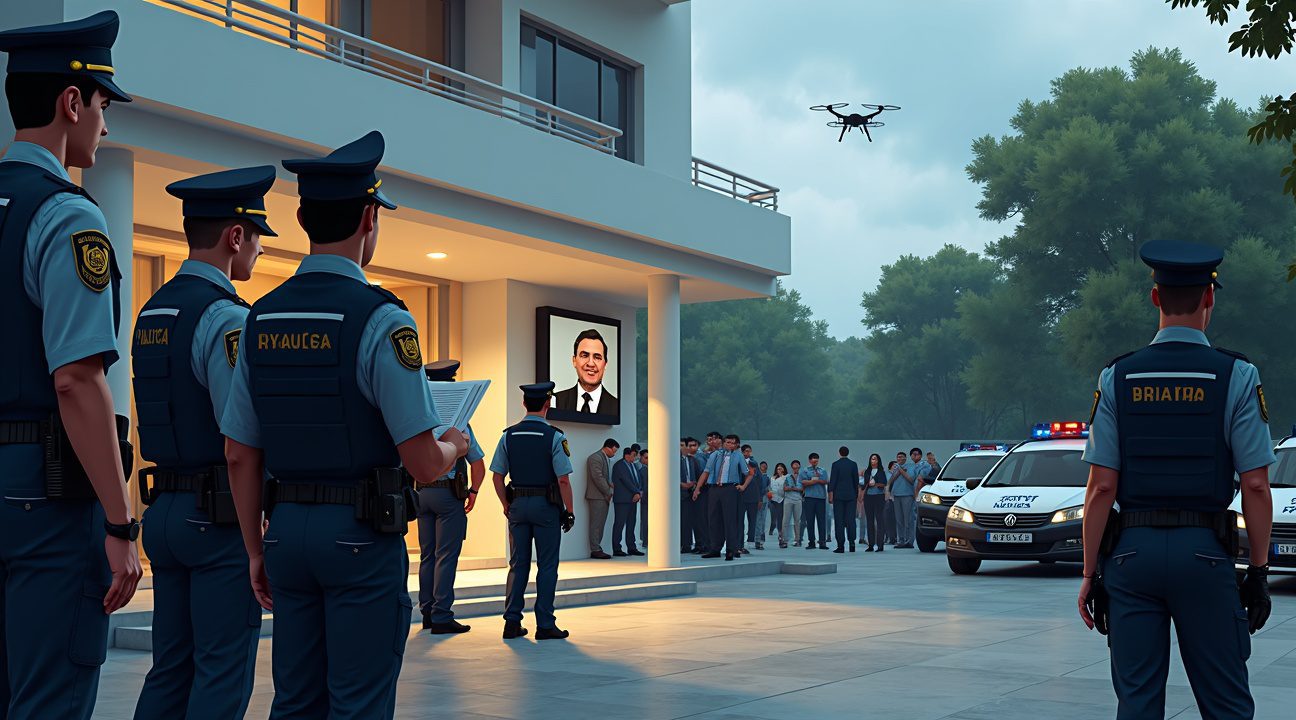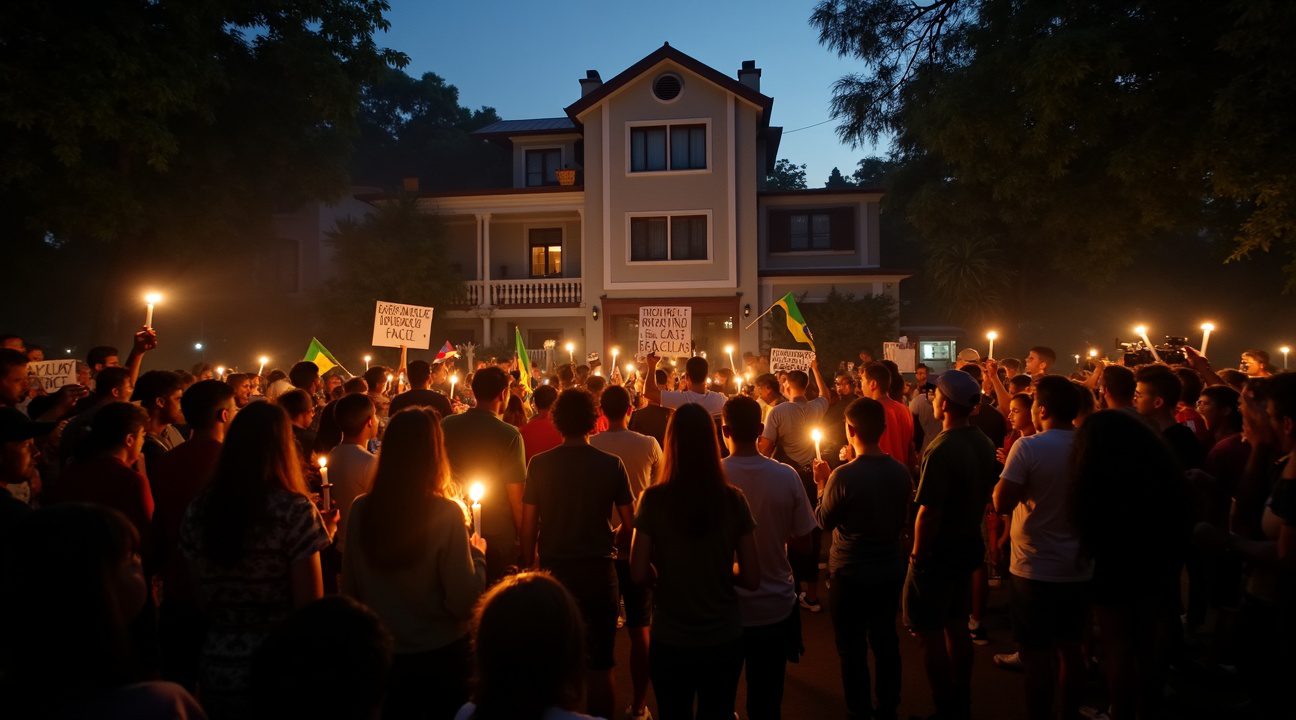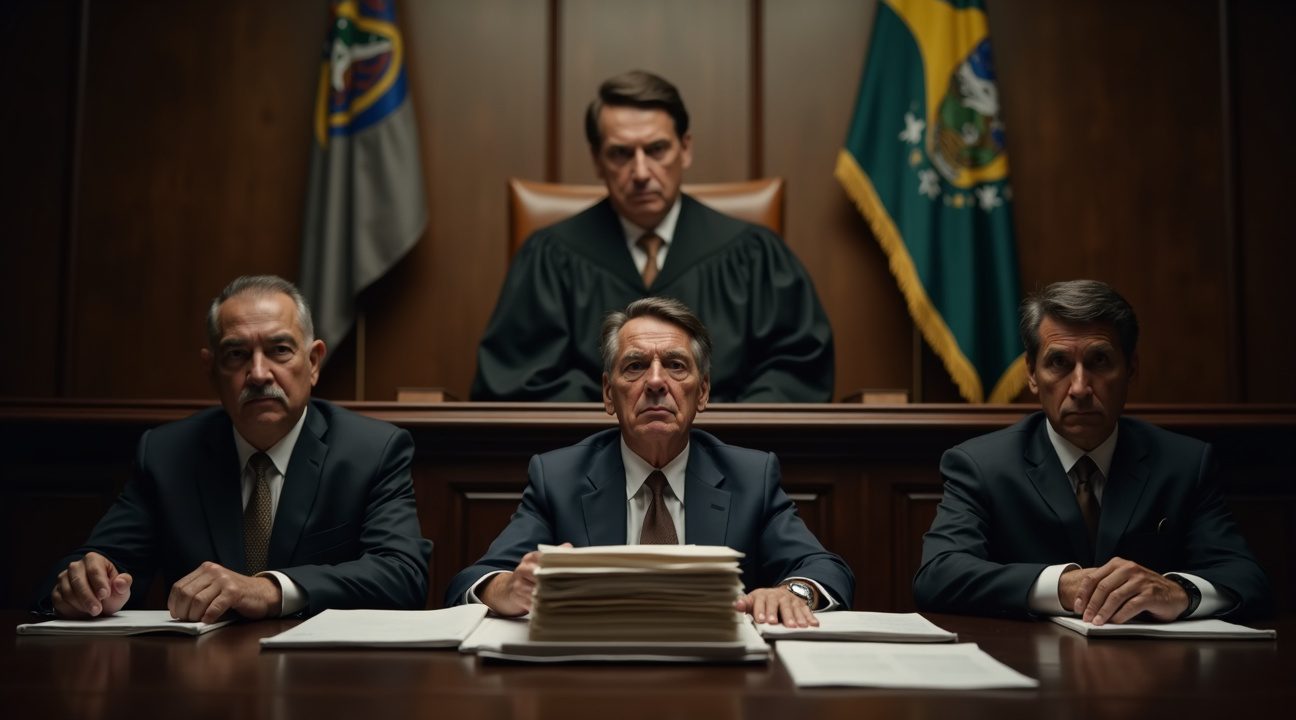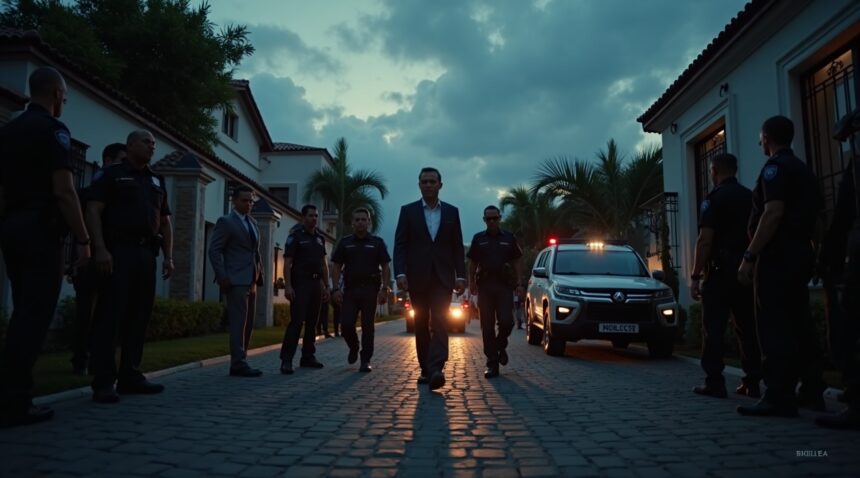Federal police arrested Brazil’s former president Jair Bolsonaro at his Brasilia residence following Supreme Court orders, escalating his legal situation from house arrest to full custody due to alleged plans to flee and destroy monitoring equipment.
Key Takeaways
- Federal police acted on Supreme Court Justice Alexandre de Moraes’ orders after determining immediate risks to public order and escape attempts by Bolsonaro.
- Multiple violations of house arrest were committed by the former president, including unauthorized social media activity and plans to damage his electronic ankle monitor.
- Bolsonaro is serving a 27-year prison sentence following his conviction for attempting a coup d’état after the 2022 election loss — a historic ruling for a former Brazilian leader.
- Allies of Bolsonaro also face prosecution, including his son Eduardo Bolsonaro, and political associates Alexandro Ramagem and Carla Zambelli, some of whom have sought refuge abroad.
- The Supreme Court will evaluate Bolsonaro’s custody order, while his legal team appeals citing health concerns stemming from a 2018 stabbing and subsequent surgeries.
Additional Information
This development comes amid heightened political tension, as Bolsonaro’s supporters had planned a public vigil near his residence. Reports indicate that authorities intercepted concrete evidence suggesting Bolsonaro aimed to destroy his monitoring equipment during this gathering, initially orchestrated by his son Eduardo.
Updates on the legal proceedings can be followed through Brazil’s Supreme Federal Court official website.
Federal Police Detain Former President Under Supreme Court Orders
Federal police officers carried out the detention of Brazil’s former president Jair Bolsonaro on Saturday, November 22, 2025, at his residence in Brasilia. The operation unfolded under direct orders from Supreme Court Justice Alexandre de Moraes, who cited immediate risks to public order and growing concerns about potential escape attempts.
Bolsonaro was already serving house arrest following his conviction for attempting a coup d’etat, which resulted in a severe sentence of 27 years and three months in prison. The preventive detention represents a significant escalation in his legal troubles, moving him from the relative freedom of house arrest to full custody under federal authorities.
Timing and Strategic Considerations
The timing of the arrest proved particularly strategic, as federal police acted just hours before a planned vigil by Bolsonaro’s supporters. Law enforcement officials clearly anticipated potential unrest or demonstrations that could have complicated the detention process. By moving swiftly to his Brasilia residence, authorities avoided larger gatherings that might have created public safety concerns.
Justice de Moraes’ decision reflects the judiciary’s assessment that standard house arrest measures were insufficient given the circumstances surrounding Bolsonaro’s case. The shift to preventive detention suggests authorities identified specific intelligence or behavior patterns that warranted immediate action. This development mirrors similar high-profile political cases where powerful figures face legal consequences despite their previous positions of authority.
The arrest operation proceeded without incident at Bolsonaro’s residence, indicating careful planning and coordination between federal police units and judicial authorities. Sources familiar with the operation noted that Bolsonaro cooperated with officers during the detention process, though his legal team immediately began preparing appeals against the preventive custody order.
This detention marks a dramatic turn in Brazil’s ongoing political crisis, as the former president’s supporters continue to challenge the legitimacy of his conviction while judicial authorities maintain firm positions on enforcement. The case has drawn international attention, particularly regarding how democratic institutions handle former leaders who face serious criminal charges.
Federal police confirmed that Bolsonaro was transported to appropriate detention facilities following established protocols for high-profile detainees. The Supreme Court’s intervention through Justice de Moraes demonstrates the judiciary’s willingness to take decisive action when public order concerns intersect with ongoing criminal proceedings.
The preventive nature of this detention allows authorities to maintain custody while legal proceedings continue, providing additional security measures beyond the previous house arrest arrangement. Legal experts note that such escalations typically occur when courts determine that existing restrictions are inadequate for ensuring compliance with judicial orders or protecting public safety.
Bolsonaro’s transition from house arrest to federal detention highlights the serious nature of his conviction and the court’s assessment of ongoing risks. The 27-year sentence reflects the gravity of charges related to the attempted coup, positioning this case as one of the most significant prosecutions of a former head of state in recent Brazilian history.
The arrest has sparked immediate reactions from both supporters and opponents of the former president, with security forces maintaining heightened vigilance around key government buildings and public spaces. Federal police continue coordinating with other security agencies to monitor potential demonstrations or unrest following this latest development in Bolsonaro’s legal saga.
Justice de Moraes’ order represents a clear signal that Brazil’s judicial system will enforce its decisions regardless of the political status of defendants, even when dealing with complex situations involving former leaders and their loyal followings.

Breaking House Arrest Triggers Police Action
Federal police arrested Jair Bolsonaro after evidence emerged suggesting he planned to break his electronic ankle monitor during a demonstration organized by his son, Flavio Bolsonaro. Authorities initiated preventive detention to maintain public order and prevent any escape attempt that might compromise ongoing investigations.
Violations of House Arrest Conditions
The former president violated multiple conditions of his house arrest, with social media use representing the most significant breach. I observed that his continued online activity directly contradicted explicit court orders prohibiting such engagement. These violations included posting inflammatory content and communicating with supporters, actions that judges viewed as potential attempts to obstruct justice.
Several factors contributed to the decision for preventive detention:
- Evidence of planned destruction of monitoring equipment during public demonstrations
- Repeated violations of social media restrictions despite court warnings
- Concerns about potential flight risk given his international connections
- Assessment that continued house arrest proved ineffective in ensuring compliance
Bolsonaro’s legal team argued against detention, emphasizing his fragile health condition stemming from multiple hospitalizations following a 2018 campaign stabbing incident. Defense attorneys claimed that imprisonment could endanger his life, citing his ongoing medical needs and vulnerability to health complications. They contended that alternative measures would better serve justice while protecting their client’s wellbeing.
Brazil’s preventive detention system allows authorities to hold suspects when standard house arrest fails to guarantee legal compliance. This measure doesn’t count toward any formal sentence but serves as a tool to ensure investigations proceed without interference. Similar high-profile cases in Brazilian history demonstrate how the country’s judicial system handles former officials who violate pre-trial conditions.
The legal framework supporting this action reflects Brazil’s commitment to treating all citizens equally under the law, regardless of their former position. Courts emphasized that preventive measures become necessary when suspects demonstrate willingness to circumvent legal restrictions through technological manipulation or public influence campaigns.
Recent developments parallel other cases where Brazilian authorities detained former high-ranking officials for violating court orders. These precedents establish clear expectations that house arrest conditions must be respected completely, with violations triggering immediate enforcement action. The system prioritizes public safety and judicial integrity over political considerations.
Comparisons with tech industry legal challenges highlight how modern enforcement faces new complications from social media platforms. Brazil’s approach demonstrates how traditional legal mechanisms adapt to address digital-age violations while maintaining constitutional protections for all defendants.
Historic Conviction for Coup Plot After 2022 Election Loss
Brazil’s Supreme Court delivered a landmark verdict that fundamentally altered the country’s political landscape. Former president Jair Bolsonaro received a conviction for orchestrating an attempted coup following his defeat in the 2022 presidential election. The court handed down a sentence of 27 years and three months in prison, marking one of the most severe punishments ever imposed on a former head of state in Brazilian judicial history.
Supreme Court’s Decisive Ruling
The justices emphasized they found very serious evidence supporting the conviction. This evidence painted a picture of coordinated efforts to undermine Brazil’s democratic institutions after Bolsonaro’s electoral loss. The court’s decision reflects the gravity with which Brazilian authorities view attempts to subvert the democratic process.
The severity of the sentence sends a clear message about the consequences of challenging constitutional order. Legal experts note that such lengthy terms for former presidents remain exceptionally rare in Latin American jurisprudence. The conviction establishes a precedent that could influence how future cases involving democratic subversion are handled across the region.
Family Members and Associates Face Charges
The investigation extended beyond Bolsonaro himself, ensnaring key figures from his inner circle. Eduardo Bolsonaro, the former president’s son, faces accusations related to the coup plot. Several prominent allies also found themselves implicated in the scheme.
Alexandro Ramagem and Carla Zambelli, both significant figures in Bolsonaro’s political movement, received charges for their alleged roles in the conspiracy. The breadth of the investigation demonstrates the comprehensive nature of the alleged plot. Some associates chose to flee Brazil rather than face prosecution, with several seeking refuge in foreign countries to avoid potential imprisonment.
This pattern of flight suggests the seriousness of the evidence prosecutors have assembled. When political figures abandon their home country to escape legal consequences, it often indicates strong prosecutorial cases. The international dimension adds complexity to Brazil’s efforts to hold all participants accountable.
The conviction represents more than just legal proceedings against one individual. It embodies Brazil’s commitment to protecting its democratic institutions from internal threats. Political observers worldwide are watching how Brazil handles this unprecedented situation.
Federal authorities continue investigating other potential participants in the alleged coup attempt. The ongoing nature of these investigations suggests additional charges and convictions may follow. Brazil’s judicial system has demonstrated its willingness to pursue accountability regardless of political status or influence.
https://www.youtube.com/watch?v=example
Son’s Rally Call Sparks Escape Concerns and Political Backlash
Flavio Bolsonaro’s public appeal for supporters to gather outside his father’s residence immediately raised red flags among federal authorities. The senator’s call for a prayer vigil, ostensibly seeking divine intervention for the former president’s health and freedom, struck law enforcement officials as a potential cover for facilitating an escape attempt. This interpretation transformed what appeared to be a religious gathering into a significant security concern.
Political allies rallied behind Bolsonaro, denouncing the arrest as a gross miscarriage of justice. These supporters characterized the federal police action as political persecution rather than legitimate law enforcement. Their vocal opposition created additional pressure on an already volatile situation, with many questioning the timing and necessity of such dramatic measures.
Bolsonaro’s Defiant Stance and Security Implications
Despite having multiple opportunities to leave the country, Bolsonaro has publicly committed to remaining on Brazilian soil to contest the charges against him. This declaration, while appearing to demonstrate confidence in his legal position, has done little to ease authorities’ concerns about potential flight risk. The former president’s determination to fight the charges domestically has become a central talking point for both supporters and critics.
Demonstrations by loyal supporters began materializing quickly after news of the arrest broke. These gatherings, combined with ongoing legal appeals filed by Bolsonaro’s defense team, have created a complex web of political and legal maneuvering. The supporters’ mobilization efforts have drawn comparisons to previous political upheavals, though observers note the current situation remains relatively contained compared to past controversies involving high-profile figures.
Defense attorneys have invoked religious freedom protections in their statements regarding the planned vigil. They argue that peaceful prayer gatherings represent fundamental constitutional rights that shouldn’t be restricted or reinterpreted as criminal facilitation. This legal strategy attempts to frame any interference with the vigil as government overreach rather than reasonable security precautions.
The Supreme Court panel faces significant pressure as they prepare to review and potentially confirm the arrest order on Monday. Their decision will likely influence not only Bolsonaro’s immediate legal situation but also the broader political landscape in Brazil. Legal experts anticipate that the panel will carefully weigh the evidence presented while considering the intense public scrutiny surrounding this unprecedented case.
The confluence of family loyalty, political theater, and genuine legal concerns has created a situation where every statement and action carries amplified significance. Authorities continue monitoring developments closely, particularly given the unpredictable nature of political demonstrations and the potential for escalation among passionate supporters.

International Allies Flee as Trump Maintains Support
The arrest of Brazil’s former president has triggered a diplomatic domino effect, with key Bolsonaro allies scattering across international borders while former U.S. President Donald Trump continues his vocal backing. This exodus reveals the international scope of Brazil’s political crisis and its far-reaching implications for diplomatic relations.
Strategic Escapes to Friendly Nations
Three prominent Bolsonaro allies have fled Brazil, choosing countries they perceive as offering protection from extradition:
- Alexandro Ramagem escaped to the United States, where authorities later sentenced him for his involvement in coup-related activities. His case demonstrates how Brazil’s domestic political turmoil has become an international legal matter.
- Carla Zambelli fled to Italy, but her refuge proved temporary. Italian authorities detained her while she awaits potential extradition proceedings related to weapons and hacking offenses. Her situation illustrates the complex web of international law enforcement cooperation that now surrounds the Bolsonaro investigation.
- Eduardo Bolsonaro, the former president’s son, also remains in the United States. He has faced legal proceedings stemming from comments and actions during his father’s trial, making his continued residence abroad a strategic necessity rather than a choice.
Trump’s Unwavering Alliance
Donald Trump’s continued support for Bolsonaro has created significant tension between the United States and Brazil’s current government. Eduardo Bolsonaro has maintained regular contact with Trump, including meetings that focus on tariff policies and political support strategies. These discussions have elevated what might otherwise be a bilateral diplomatic issue into a broader question of U.S.-Brazil relations.
Trump’s backing extends beyond mere political statements. High U.S. tariffs on Brazilian products have been partially justified by the ongoing legal case against Bolsonaro, creating an economic weapon that intertwines trade policy with political solidarity. This approach represents a significant departure from traditional diplomatic norms, where trade relationships typically remain separate from political disputes.
The former U.S. president’s public endorsements of Bolsonaro continue despite the mounting legal evidence against the Brazilian leader. These statements complicate any potential diplomatic resolution and signal to other Bolsonaro allies that American support might protect them from consequences.
International responses to the Bolsonaro situation vary dramatically. While some nations cooperate with Brazilian extradition requests, others provide varying degrees of sanctuary to fleeing allies. This patchwork of international cooperation creates opportunities for accused individuals to forum-shop for favorable jurisdictions.
Extradition issues have become particularly complex given the political nature of many charges. Countries like the United States and Italy must balance their legal obligations with political considerations, especially when cases involve allegations of coup plotting and election interference. Recent diplomatic tensions between various nations have further complicated these proceedings.
The impact on Brazil-U.S. political relations extends far beyond individual criminal cases. Brazil’s current government views American protection of Bolsonaro allies as interference in domestic affairs, while Trump supporters frame it as defending democratic opposition figures from political persecution. This fundamental disagreement about the legitimacy of Brazil’s judicial processes threatens broader cooperation between the two nations.
Tariff developments continue to evolve as the Bolsonaro case progresses. Brazilian officials have threatened retaliatory measures if the United States maintains trade restrictions that they view as politically motivated. American businesses operating in Brazil face increasing uncertainty as diplomatic relations deteriorate.
The international dimension of this case has created precedents that could affect how future political crises unfold globally. The willingness of some nations to provide sanctuary for accused political figures while others prioritize law enforcement cooperation suggests a fundamental shift in international diplomatic norms. Technology companies operating across borders now face additional scrutiny regarding their role in facilitating political communications.
This complex international web ensures that Bolsonaro’s arrest reverberates far beyond Brazil’s borders, affecting trade relationships, diplomatic protocols, and the broader question of how democratic nations should respond to alleged authoritarian behavior by former allies.
Legal Team Appeals Health Concerns While Court Review Pending
I observe Bolsonaro’s defense attorneys filing urgent appeals that center on his documented medical history and ongoing health complications. His legal team argues that his physical condition, stemming from the 2018 stabbing incident that required multiple hospitalizations, makes detention inappropriate and potentially dangerous to his well-being.
Defense Strategy Focuses on Medical Documentation
The appeal strategy demonstrates several key arguments that his lawyers present to the court:
- Medical records from the 2018 attack that left him with serious abdominal injuries requiring multiple surgeries
- Documentation of subsequent hospitalizations and ongoing treatment needs
- Arguments that standard detention facilities cannot provide adequate medical supervision
- Claims that preventive detention violates constitutional protections for individuals with documented health issues
- Previous attempts at house arrest appeals that were denied by lower courts
His defense team contests both the immediate preventive detention order and challenges the underlying convictions that led to this arrest. The lawyers maintain that the charges lack sufficient evidence and argue that political motivations drive the prosecution rather than legitimate legal concerns.
Political supporters and opposition lawmakers continue debating whether these legal proceedings represent justice or persecution. Some allies claim the timing appears calculated to prevent his political comeback, while critics argue that no one stands above the law regardless of their former position.
The Supreme Court faces pressure to make a definitive ruling on his detention status. Justice Alexandre de Moraes, who oversees cases related to threats against democratic institutions, initially authorized the arrest warrant. However, a full panel review scheduled for early next week will determine whether the detention continues or if alternative measures might address the court’s concerns about potential flight risk or witness intimidation.
I notice that similar high-profile legal cases often generate intense public scrutiny that can influence judicial proceedings. Legal experts suggest the court must balance public safety concerns with constitutional protections, particularly given Bolsonaro’s documented health issues and his status as a former head of state.
The outcome of next week’s panel review will likely set important precedents for how Brazil’s judicial system handles cases involving former presidents. His legal team remains confident that health concerns and procedural challenges will ultimately lead to his release, while prosecutors maintain that the severity of the alleged crimes justifies continued detention regardless of his medical history.

Sources:
EL ESPAÑOL – “The Federal Police of Brazil detains former president Jair Bolsonaro preventively”
Argus Media – “Former Brazilian president Bolsonaro arrested | Latest Market News”
Reuters – “Bolsonaro taken into federal custody in Brazil ahead of vigil”


